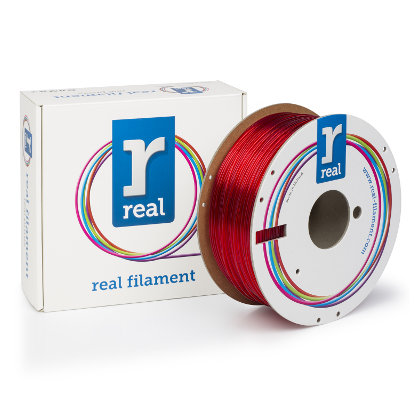PET-G / PET (Polyethylene terephthalate)
Strong, semi-flexible, weatherproof filament with a nice shine. Comes in translucent and opaque colors!

PET-G (Polyethylene terephthalate) is a very strong, water-repellent material that gives your 3d prints a beautiful shine. Most people are already familiar with PET as soda bottles. PET-G filament is rapidly increasing in popularity within the 3d print community because it has the easy characteristics of PLA and the strong durability of ABS.
Diameter
| Diameter | Tolerance | Roundness |
|---|---|---|
| 1,75 mm | 0,05 mm | 95% |
| 2,85 mm | 0,1 mm | 95% |
Characteristics
| Physical characteristics | Test method | Typical value |
|---|---|---|
| Specific gravity | ASTM D1505 | 1,27g/cc |
| MFI | - | - |
| Tensile strength | ASTM D638 | 50 MPa 7300 psi |
| Elongation at break | ASTM D638 | 28 MPa 4100 psi |
| Tensile modulus | ASTM D790 | 2100 MPa 305000 psi |
| Impact strength | - | 33 joules |
Thermal characteristics
| Description | Test method | Typical value |
|---|---|---|
| Print temperature | - | 230 - 250 C |
| Melt temperature | - | 250 C +/- 10 C |
| Melting point | - | - |
| Vicat softening temperature | ISO 306 | +/- 85 C |
Packaging
All the filaments we sell are nicely boxed with usage and material properties printed directly on the inside cover, including the recommended print and heated bed temperature ranges. In addition, each spool is vacuum sealed with a moisture-reducing silicate bag to ensure filament longevity.
How to store the filament?
Filament quality and storage is one of the most important ingredient for beautiful prints. Many people focus strictly on the immediate appearance of a product and forget that a well-preserved spool is just as important. But is the biggest contribution to medium to long-term filament degradation? The answer is usually "moisture". Filament can't handle moisture very well and that is why we recommend storing your filament in a cool, dry environment, ideally in a package vacuum sealed with silicate.